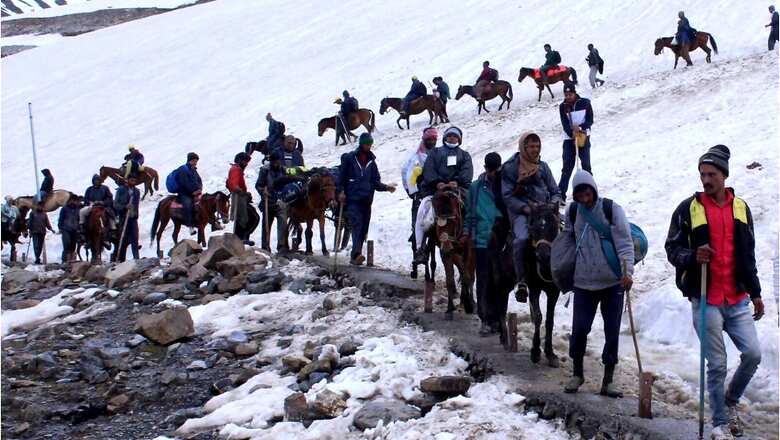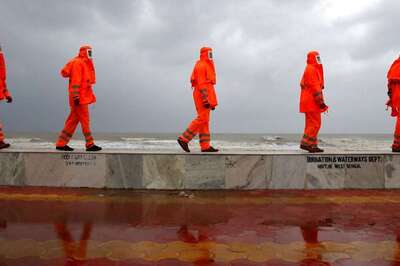
views
More mobile towers will be installed and oxygen cylinders will be available among other health facilities at 6,000 feet for pilgrims undertaking the Amarnath Yatra. Union home minister Amit Shah reviewed preparations for the annual pilgrimage at two back-to-back high-level meetings in New Delhi on Tuesday, including logistical and security measures.
Shah held the two meetings ahead of the pilgrimage, scheduled to begin on June 30, after several targeted killings, including of Kashmiri Pandits, in Jammu and Kashmir. The central government will be taking extra health precautions due to Covid-19 as this is the first yatra after the pandemic struck in 2020. Due to high altitude, the government is making adequate arrangements especially for those pilgrims who may have health-related issues.
During the marathon meetings, Shah said it was the priority of the Narendra Modi-led government that pilgrims should have easy access to darshan. He gave instructions for adequate arrangements for all required facilities including movement, lodging, electricity, water, communications and healthcare.
Shah instructed that the number of mobile towers should be increased for better communication and dissemination of information about the travel route. He also directed that machines should be deployed to open the route immediately in case of landslides.
Oxygen cylinders and medical beds will be available at an altitude of more than 6,000 feet while ambulances and helicopters will be deployed in case of emergencies.
Shah directed that all categories of transport services should be increased during the yatra for passenger convenience.
Jammu and Kashmir Lt Governor Manoj Sinha and union home secretary Ajay Bhalla as well as senior officials attended both meetings. National security adviser (NSA) Ajit Doval, army chief Gen Manoj Pande and Jammu and Kashmir Police chief Dilbag Singh were also present to discuss security arrangements.
Pilgrims undertake the journey to the Amarnath cave dedicated to Shiva at an altitude of 3,888 m. The yatra, which presents a massive security challenge, could not take place in 2020 and 2021 due to the pandemic and was cut short in 2019 just before the abrogation of Article 370.
This year, about three lakh pilgrims are likely to take part in the pilgrimage that is expected to end on August 11. Officials said each pilgrim will get a radio frequency identification (RFID) tag to monitor their movement and security. Earlier, RFID tags were given only to vehicles of pilgrims.
About 12,000 paramilitary personnel (120 companies) in addition to Jammu and Kashmir Police are expected to be deployed along the two pilgrimage routes, one from Pahalgam and the other via Baltal, officials added. Drone cameras will also be used to ensure security.
There has been a spurt in attacks on non-Muslims and outsiders living in the Valley since the abrogation of the Article 370 in August 2019. The review comes following a spate of killings in the union territory.
On May 12, Rahul Bhat, a government employee, was killed by terrorists inside his office in Budgam district. A day after the death of the Kashmiri Pandit, police constable Reyaz Ahmad Thokar was shot dead by terrorists at his residence in Pulwama district.
Last week, four pilgrims were killed and at least 20 injured when the bus they were travelling in caught fire near Katra in Jammu. Police suspect a sticky bomb might have been used to trigger the fire.
Bhat’s killing triggered protests by members of the Kashmiri Pandit community in the Valley demanding enhanced security and transfer of government employees to safer locations.
The Peoples Alliance for Gupkar Declaration (PAGD), a conglomerate of major J&K parties, on Sunday urged Kashmiri Pandit employees not to leave the Valley as it was their home and it would be painful for all.
(With PTI inputs)
Read all the Latest India News here




















Comments
0 comment